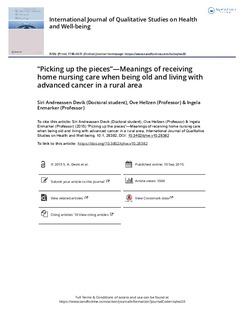| dc.contributor.author | Devik, Siri A. | |
| dc.contributor.author | Hellzèn, Ove | |
| dc.contributor.author | Enmarker, Ingela | |
| dc.date.accessioned | 2020-01-29T12:48:16Z | |
| dc.date.available | 2020-01-29T12:48:16Z | |
| dc.date.issued | 2015 | |
| dc.identifier.citation | Devik, S.A., Hellzen, O. og Enmarker, I. (2015): «Picking up the pieces»- Meanings of receiving home nursing care when being old and living with advanced cancer in rural area, International Journal of Qualitative Studies on Health and Well-being 10. | nb_NO |
| dc.identifier.uri | http://hdl.handle.net/11250/2638621 | |
| dc.description.abstract | Rural home nursing care is a neglected area in the research of palliative care offered to older cancer patients. Because access to specialized services is hampered by long distances and fragmented infrastructure, palliative care is often provided through standard home nursing services and delivered by general district nurses. This study aimed to illuminate the lived experience and to interpret the meaning of receiving home nursing care when being old and living with advanced cancer in a rural area in Norway. Narrative interviews were conducted with nine older persons, and a phenomenological hermeneutic approach was used to interpret the meaning of the lived experience. The analysis revealed three themes, each with subthemes: being content with what one gets, falling into place, and losing one's place. The phrase picking up the pieces was found useful to sum up the meaning of this lived experience. The three respective themes refer to how the pieces symbolize the remaining parts of life or available services in their environment, and how the older persons may see themselves as pieces or bricks in a puzzle. A strong place attachment (physical insideness, social insideness, and autobiographical insideness) is demonstrated by the informants in this study and suggests that the rural context may provide an advantageous healthcare environment. Its potential to be a source of comfort, security, and identity concurs with cancer patients’ strong desire for being seen as unique persons. The study shows that district nurses play an essential role in the provision of palliative care for older rural patients. However, the therapeutic value of being in one's familiar landscape seems to depend on how homecare nurses manage to locate it and use it in a more or less person-centred manner. Communication skills and attentiveness to psychosocial aspects of patient care stand out as important attributes for nursing in this context. | nb_NO |
| dc.publisher | International Journal of Qualitative Studies on Health and Well-being | nb_NO |
| dc.rights | Navngivelse 4.0 Internasjonal | * |
| dc.rights.uri | http://creativecommons.org/licenses/by/4.0/deed.no | * |
| dc.subject | advanced cancer | nb_NO |
| dc.subject | rural palliative care | nb_NO |
| dc.subject | homecare | nb_NO |
| dc.subject | district nursing | nb_NO |
| dc.subject | old people | nb_NO |
| dc.subject | identity | nb_NO |
| dc.subject | place attachment | nb_NO |
| dc.subject | qualitative research | nb_NO |
| dc.subject | phenomenological hermeneutics | nb_NO |
| dc.subject | palliativ omsorg | nb_NO |
| dc.subject | palliasjon | nb_NO |
| dc.title | “Picking up the pieces”—Meanings of receiving home nursing care when being old and living with advanced cancer in a rural area | nb_NO |
| dc.type | Journal article | nb_NO |
| dc.source.volume | 10 | nb_NO |
| dc.source.journal | International Journal of Qualitative Studies on Health and Well-being | nb_NO |
| dc.source.issue | 1 | nb_NO |
| dc.identifier.doi | https://doi.org/10.3402/qhw.v10.28382 | |

